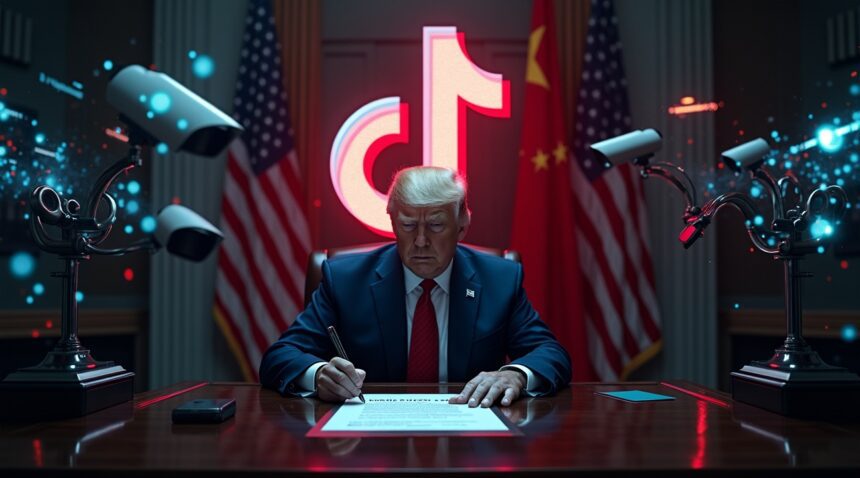President Trump signed an executive order in August 2020 invoking emergency powers to force TikTok’s Chinese parent company ByteDance to sell the platform’s US operations to American buyers, citing national security risks from potential surveillance and data sharing with foreign governments.
Key Takeaways
- Trump used the International Emergency Economic Powers Act and National Emergencies Act to mandate TikTok’s divestiture from Chinese ownership within 45 days or face a complete US ban.
- The executive order targeted TikTok’s extensive data collection practices affecting over 175 million US users, raising concerns about potential blackmail of federal employees and corporate espionage.
- Oracle led a consortium of US investors in a proposed $14 billion acquisition that would transfer control of TikTok’s data, algorithms, and content moderation to American entities.
- Federal courts blocked Trump’s ban through preliminary injunctions, citing First Amendment violations and questioning the administration’s use of emergency powers authority.
- The Biden administration rescinded Trump’s executive orders in June 2021, replacing the ban approach with a comprehensive risk-based analysis framework focused on specific security concerns.
For more detailed coverage on the national security concerns and political actions surrounding TikTok, see this New York Times article on Biden’s policy shift regarding TikTok.
Trump Invokes Emergency Powers to Force TikTok Sale Over Chinese Spying Fears
President Donald Trump escalated tensions with Chinese tech companies when he signed an executive order in August 2020 targeting TikTok’s operations in the United States. The order directly cited national security risks stemming from the app’s Chinese ownership and its extensive data collection practices, which raised concerns about potential surveillance and information sharing with foreign governments.
Trump’s executive order drew its authority from two powerful pieces of legislation: the International Emergency Economic Powers Act (IEEPA) and the National Emergencies Act. These laws granted the president broad powers to restrict or completely block business transactions between US persons and ByteDance Ltd., TikTok’s Chinese parent company. The move represented one of the most aggressive uses of emergency economic powers against a consumer technology platform in recent history.
Massive User Base Drives Security Concerns
The scale of TikTok’s reach amplified the administration’s security concerns. The app had been downloaded over 175 million times in the US alone, with global downloads exceeding 1 billion. This massive user base meant that potentially sensitive data from millions of Americans could be accessible to a Chinese-controlled entity, creating what officials described as an unacceptable national security risk.
Trump’s action built directly on his previous Executive Order 13873 from May 15, 2019, which had declared a national emergency concerning foreign-controlled information and communications technology (ICT) systems operating within US borders. That earlier order established the framework for evaluating and restricting foreign technology that could pose security threats to American infrastructure and data.
The 2020 executive order specifically prohibited any transactions with ByteDance after a 45-day period, effectively giving the company a deadline to either sell TikTok’s US operations to American buyers or face a complete ban from US app stores and web hosting services. TikTok’s owners face ban from the USA became a reality as the administration made clear that divestiture was the only path forward for continued US operations.
The executive order highlighted concerns about TikTok’s data collection practices, including location data, browsing history, and search history. Officials worried that this information could be used to build detailed profiles of American users, potentially enabling foreign influence operations or espionage activities. The order also raised concerns about the app’s content moderation policies and whether they might be influenced by Chinese government priorities rather than US legal standards.
Massive Data Collection Poses Risk to Federal Employees and Corporate Secrets
The extensive data harvesting capabilities of TikTok created significant national security vulnerabilities that prompted swift government action. I’ve observed how the platform’s sophisticated collection methods extend far beyond simple user preferences, capturing detailed location data, browsing histories, and behavioral patterns that could compromise sensitive government operations.
Federal Employee Surveillance and Blackmail Threats
The ability to track Federal employees represents one of the most concerning aspects of TikTok’s data collection practices. Government officials emphasized how the Chinese Communist Party could potentially access this information to build comprehensive dossiers on American civil servants, military personnel, and intelligence operatives. These detailed profiles could then be weaponized for blackmail purposes or to identify individuals with access to classified information.
Location tracking presents particularly acute risks for government workers. The platform’s algorithm can map movement patterns, identify frequently visited locations, and even determine security clearance levels based on workplace proximity to sensitive facilities. This granular surveillance capability extends beyond the app itself, as TikTok’s data collection methods can monitor users’ activities across multiple digital platforms and services.
Corporate Espionage and Intellectual Property Theft
Corporate secrets face similar exposure through TikTok’s data collection apparatus. I’ve analyzed how the platform’s access to browsing histories and device information could facilitate industrial espionage on an unprecedented scale. Companies developing cutting-edge technologies, pharmaceutical research, or strategic business plans become vulnerable when their employees use the application.
The risks compound when considering TikTok’s ability to cross-reference data points and identify patterns. Employee communications, meeting schedules, and even confidential project timelines could be inferred through seemingly innocuous user interactions. This intelligence gathering capability represents a significant threat to American economic competitiveness and innovation leadership.
Algorithm control emerged as another critical security concern. The US government stressed how foreign entities could manipulate TikTok’s recommendation system to:
- Shape public opinion
- Spread disinformation
- Suppress certain viewpoints
By ensuring American ownership of the algorithm, officials aim to prevent the platform from becoming a propaganda tool that could influence everything from election outcomes to public health responses.
The transfer mandate aligns with broader Information and Communication Technology (ICT) supply chain security initiatives that the government has implemented across multiple sectors. These comprehensive measures recognize that data security threats extend beyond individual applications to encompass entire technological ecosystems. TikTok’s owners face ban from the USA if they don’t divest, highlighting the serious nature of these security concerns.
Federal agencies have documented instances where foreign-controlled applications collected sensitive information without explicit user consent. TikTok’s terms of service allowed for extensive data sharing with third parties, including entities operating under foreign jurisdiction. This arrangement created pathways for unauthorized access to American citizens’ personal information and potentially classified government data.
The executive order addressing TikTok ownership reflects growing awareness of how social media platforms can serve dual purposes as entertainment venues and intelligence gathering tools. Government cybersecurity experts have identified specific vulnerabilities in TikTok’s architecture that could enable remote access to user devices, unauthorized data extraction, and covert surveillance operations.
Modern data collection techniques employed by platforms like TikTok can reconstruct detailed user profiles even from seemingly anonymous interactions. Machine learning algorithms analyze:
- Typing patterns
- Voice recordings
- Facial expressions
- Social connections
to create comprehensive behavioral maps. These digital fingerprints become valuable assets for foreign intelligence services seeking to understand American society’s structure and vulnerabilities.
The concentration of so much personal data under foreign control presents systemic risks that extend beyond individual privacy concerns. When aggregated and analyzed at scale, this information could reveal strategic insights about American infrastructure, economic trends, and social dynamics that adversaries could exploit for geopolitical advantage.

Oracle Emerges as Lead Buyer in 14 Billion Dollar Deal Structure
The executive order mandated that ByteDance divest TikTok’s US operations to a US-approved buyer, setting the stage for one of the most significant tech acquisitions in recent history. TikTok’s owners face pressure to complete this divestiture or risk losing access to the American market entirely.
Oracle’s Strategic Position in the Acquisition
US tech firm Oracle was identified as part of a blue chip group of investors poised to take a major role in operations and data management. The company’s expertise in enterprise cloud infrastructure and database management makes it an ideal candidate to handle TikTok’s massive data requirements. Oracle’s involvement addresses critical concerns about data security and algorithmic transparency that have plagued the platform.
The app would be valued at around 14 billion dollars under the proposed deal, with US-based companies such as Oracle being considered as major stakeholders. This valuation reflects TikTok’s enormous user base and advertising revenue potential in the American market. Oracle’s participation in this consortium brings established credibility and technical capabilities that satisfy regulatory requirements while maintaining the platform’s functionality.
Control Structure and Security Framework
Under this structure, American investors would control TikTok’s data and algorithm, addressing both security and content governance concerns. The arrangement ensures that sensitive user information remains within US jurisdiction and prevents potential foreign interference in content moderation decisions. Oracle’s cloud infrastructure would likely house TikTok’s US operations, creating a complete separation from ByteDance’s Chinese servers.
The deal structure establishes several layers of American oversight:
- Oracle would manage the technical infrastructure.
- Other US investors would handle content policies and business operations.
- Ongoing government oversight ensures continued compliance with national security requirements.
American control extends beyond data storage to include algorithm management and content recommendation systems. This comprehensive approach addresses concerns about potential manipulation of user feeds or suppression of certain viewpoints. Oracle’s involvement provides the technical expertise necessary to maintain these systems while ensuring transparency with regulatory authorities.
The financial structure reflects the complexity of transferring such a valuable digital asset. The 14 billion dollar valuation accounts for TikTok’s user base, technology infrastructure, and future revenue potential in the US market. Oracle’s investment represents both a business opportunity and a strategic move to expand its presence in social media infrastructure.
Implementation of this deal would create a new model for foreign tech company acquisitions in the United States:
- Preserve TikTok’s core functionality and user experience.
- Ensure American control over critical data and content operations.
- Establish regulatory frameworks for transparency and oversight.
The acquisition framework also addresses content governance concerns by placing decision-making authority with American entities. This shift ensures that content policies align with US standards and legal requirements. Oracle’s role extends beyond technical management to include compliance monitoring and reporting to regulatory authorities.
This deal structure represents a compromise between maintaining TikTok’s popular features and addressing legitimate security concerns. Oracle’s involvement provides the technical foundation necessary to support the platform while ensuring transparency and accountability. The arrangement creates a precedent for how foreign-owned social media platforms might operate under American oversight in the future.

Courts Block Trump Ban While Biden Administration Charts New Course
Federal courts moved swiftly to challenge Trump’s executive actions against TikTok, creating significant legal roadblocks that prevented immediate implementation. Multiple federal judges issued preliminary injunctions that effectively halted the bans, citing serious constitutional concerns that undermined the administration’s authority.
First Amendment Challenges Emerge
The most compelling legal arguments centered on First Amendment protections, with courts recognizing TikTok as a platform for free expression and communication. Judges found that banning the app would restrict millions of Americans’ ability to engage in protected speech activities. Constitutional scholars argued that the government couldn’t impose such broad restrictions without demonstrating clear and present dangers that justified limiting free speech rights.
Courts also scrutinized the administration’s use of emergency powers, questioning whether the International Emergency Economic Powers Act provided sufficient authority for such sweeping actions. Legal experts pointed out that the emergency powers framework wasn’t designed to target specific companies based on nationality concerns alone. This legal foundation proved insufficient to withstand judicial review, particularly when balanced against constitutional protections.
Biden’s Administrative Reset
President Biden fundamentally altered the approach when he took office, rescinding Trump’s executive orders in June 2021. Rather than pursuing outright bans, the new administration implemented a comprehensive risk-based analysis framework that focused on specific security concerns rather than blanket prohibitions.
Biden’s strategy emphasized thorough security reviews conducted through established government agencies, contrasting sharply with the previous administration’s immediate ban approach. This methodical process allowed for detailed examination of:
- Data handling practices
- Algorithmic transparency
- Potential foreign influence operations
without resorting to constitutional challenges.
The shift represented a significant departure from Trump’s directive style, favoring collaborative engagement with technology companies over adversarial regulatory actions. Biden’s team worked directly with ByteDance and other stakeholders to address security concerns through negotiated agreements rather than forced divestiture.
This administrative approach proved more legally sustainable because it avoided the constitutional pitfalls that derailed the previous bans. By focusing on specific security risks and working within established regulatory frameworks, the Biden administration sidestepped the First Amendment challenges that had proven fatal to Trump’s executive actions.
The contrast between these two approaches highlighted fundamental differences in how administrations can address national security concerns involving popular consumer technology platforms. While Trump’s direct action faced immediate legal challenges, Biden’s measured approach demonstrated how careful policy development could achieve security objectives without triggering constitutional conflicts. The legal precedents established during this period continue to influence how TikTok’s owners face regulatory pressure from federal authorities today.
Sources:
Trump White House Archives, “Executive Order on Addressing the Threat Posed by TikTok”
Media Law Monitor, DWT Blog, “Biden Administration Rescinds Trump’s TikTok and WeChat Bans”
CBS Evening News, “Trump signs executive order paving way for TikTok deal to avoid ban”


